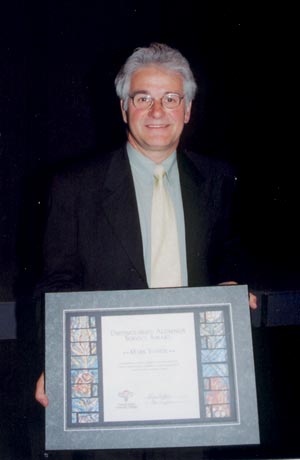Mark Yantzi embodies the spirit and tradition of peacemaking and conflict resolution that lies at the heart of Grebel's Peace and Conflict Studies program.
"Mark Yantzi embodies the spirit and tradition of peacemaking and conflict resolution that lies at the heart of Grebel's Peace and Conflict Studies program," says Henry Paetkau, Conrad Grebel University College President. Yantzi is the 2004 recipient of the Conrad Grebel Distinguished Alumni Service Award.
Yantzi is the executive director of Community Justice Initiatives (CJI), which was born in 1978 as part of a new program with Mennonite Central Committee (MCC). CJI is a non-profit organization, known world-wide as having started the first restorative justice program. They provide services for families, friends, groups, neighbours, schools, and the workplace, in conflict resolution, sexual trauma and support for women after they leave prison. Their programs are founded on principles of restorative justice, a way of addressing conflict and crime that engages the person who caused the harm and people who were affected by the harm.
Yantzi says that much of restorative justice’s importance "lies in it providing an antidote to the over institutionalising of justice making. Restorative justice allows for a reconnection of things that have been harmed or damaged by conflict and crime."
As a student from Grebel’s "early years," Yantzi graduated from the University of Waterloo in 1969 with his undergraduate degree in sociology. He lived off campus was an associate at Grebel, and remembers lots of good discussions sitting around the study carrels and over the noon meal. He also spent a lot of time with Grebel residents in the pool and ping pong table room.
"Grebel was always a friendly congenial place to be," Yantzi said. The most "impactful recollection" for Yantzi was attending Walter Klaassen’s course in Christian Foundations. "Coming from a fairly conservative rural church, I found that course provided a vehicle for me to connect and revise my faith with a growing knowledge base that was changing in so many areas."
After he graduated, Yantzi volunteered for 2 years with MCC at a local Probation and Parole Office. This program, the Victim Offender Reconciliation Program (VORP), was a new initiative under Doug Snyder's guidance. While Yantzi never made a conscious decision to work in restorative justice, he claims that "MCC led me into a life of crime! I certainly wouldn’t have considered being a probation officer otherwise. It somehow would have seemed too militaristic or too closely aligned with police work."
Yantzi says, "I enjoyed the contact with the Criminal Justice System while working for change. Dave Worth and I used to talk in those early days about being “in the system but not of the system”, a play on the phrase popular in church circles at that time, “in the world but not of the world.”
The probation office eventually hired Yantzi and he worked there until 1979. In 1974, Yantzi was part of the birth of what 30 years is seen as the origins of Restorative Justice as a result of the infamous "Elmira Case." When Yantzi suggested that 2 teenage vandals meet with their victims to apologize and determine restitution. The move sparked what has become a world-wide movement in restorative justice. This event and the beginning of Victim_offender Reconciliation Program (VORP) is also being celebrated at a national conference in Kitchener hosted by the Conflict Resolution Network June 2 to 4. Other key players in the case were David Worth, who is currently working with MCC in Akron, and Judge Gordon McConnell (who is now a member of the board for Community Justice Initiatives).
Yantzi completed his Master of Applied Science at University of Waterloo from the Faculty of Human Relations and Counseling from 1975-1977 (incidentally, Yantzi was probably last student to graduate from that program) and his last term was completed at Associated Mennonite Biblical Seminary in Elkhart, Indiana. Yantzi was then elected to Kitchener City Council in 1982, where he worked until 2000. He was also on the Region of Waterloo Council from 1984 to 2000 where he worked heavily for the development of non-profit housing and promoted neighbourhood involvement and urban core development.
Yantzi is a well-known expert in his field, with training in sexual misconduct by professionals, and divorce mediation. He has presented workshops in Canada, US, England and Estonia, dealing with criminal justice alternatives, community response to sexual abuse, and responses to sexual offending. He has written Sexual Offending and Restoration (Herald Press), as well as edited Three Paths to Healing (Pandora Press) and been a contributor to The Challenge of Forgiveness (from the Saint Paul University Research series). Yantzi also won the 2003 Ron Wiebe Restorative Justice Award established 5 years ago in memory of an innovative British Columbia prison warden who thought "outside the box," awarded by the Restorative Justice branch of the Ministry of Corrections.
The Distinguished Alumni Service Award was established in 2002 to recognize former Grebel students who have, in some notable way, demonstrated the ideals and purposes of Conrad Grebel University College by making a unique contribution to the church, community nation, or world that is significant and worthy of recognition.
"Mark Yantzi has made a unique and innovative contribution to our community, and to the world, by demonstrating the possibilities of a restorative justice approach to conflict and crime. Restorative justice has been recognized internationally as a healthy alternative to the retributive justice system," says Henry Paetkau. "Yanzti is one of many Grebel alumni who are making a major impact in the world. We are pleased and honoured to present him with the Distinguished Alumni Award."
Yantzi was very surprised and very honored by the award. The award is extra meaningful for him because "Grebel had such a pivotal role in my involvement in post secondary education. It is also gratifying to have an academic institution recognize pursuits that are a practical application of the principles of peace and justice rather than in a more academic undertaking."
